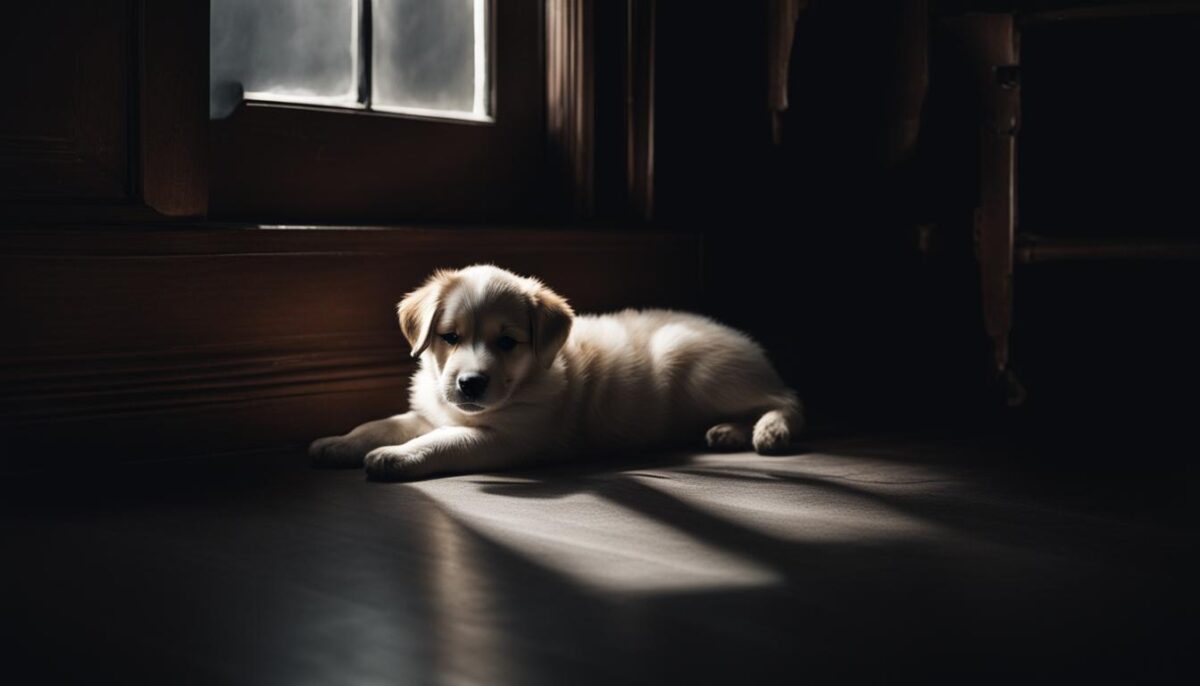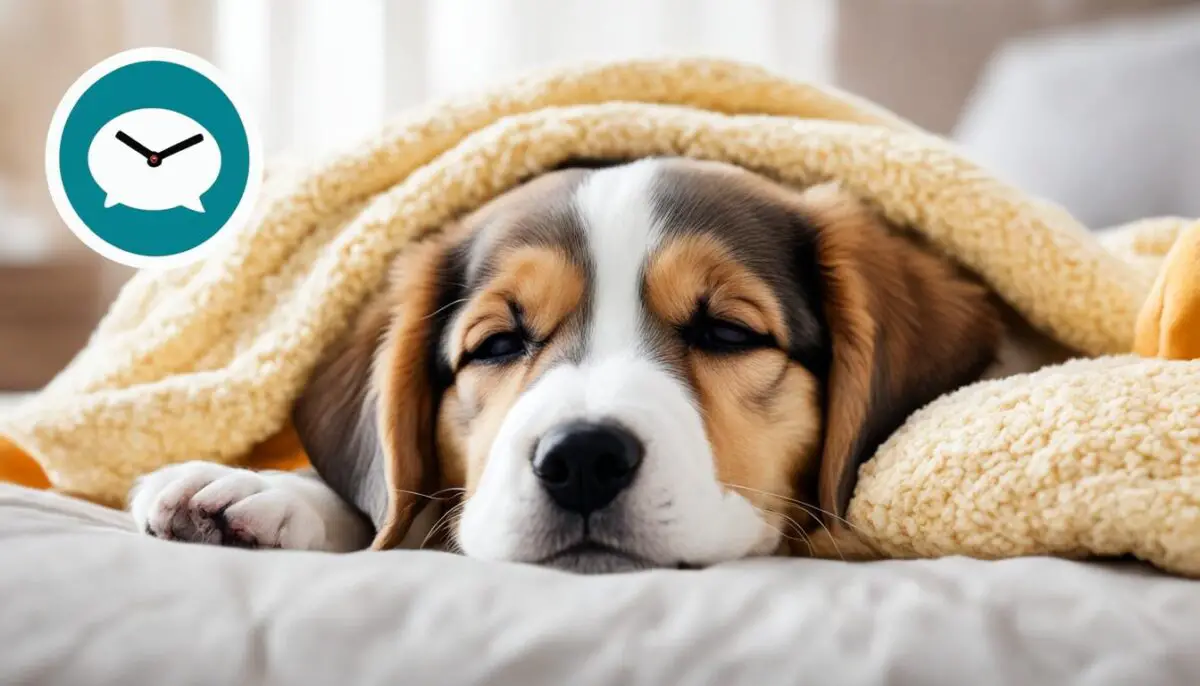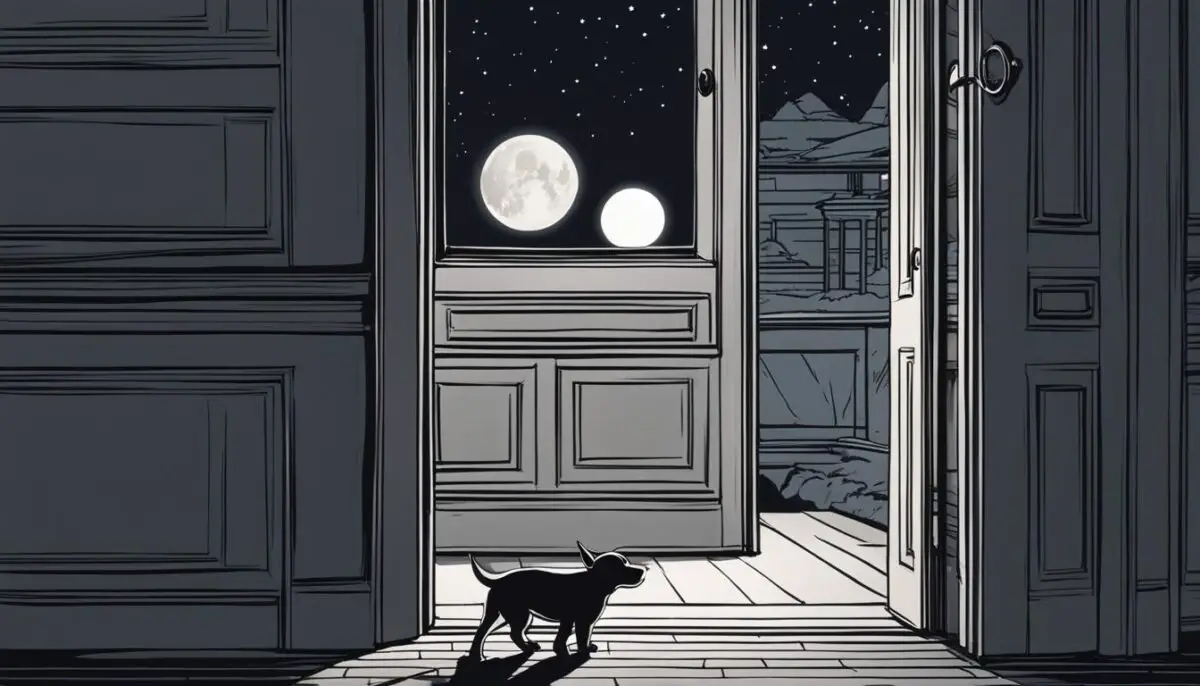Bringing home a new puppy is an exciting experience, but dealing with their whining at night can be a challenge. If you find yourself struggling to get a good night’s sleep due to your puppy’s constant whining, don’t worry! We’ve got you covered. In this article, we’ll explore the reasons why puppies whine at night and provide you with effective strategies to help soothe your furry friend and ensure both of you can rest peacefully.
Key Takeaways:
- Understanding the reasons behind your puppy’s whining at night is crucial in addressing the behavior effectively.
- Establishing a consistent routine and implementing proper training techniques can help your puppy adjust to their sleeping environment.
- While it’s natural to want to comfort a whining puppy, avoid providing excessive attention that may reinforce the behavior.
- Ensuring your puppy gets enough physical and mental exercise during the day can help reduce excessive whining at night.
- Creating a calm and quiet sleeping environment, free from distractions, is important in minimizing whining at night.
Understanding Why Puppies Whine at Night
Puppies are known to exhibit whining behavior at night, and it’s essential for pet owners to understand the underlying reasons behind this behavior. By identifying the cause of their whining, you can effectively address and alleviate their distress, ensuring a peaceful night’s sleep for both you and your furry companion.
There are several common reasons why puppies whine at night:
- Separation Anxiety: Puppies may experience separation anxiety when they are left alone in a new environment or when they are separated from their littermates and mother. Whining becomes their way of expressing distress and seeking reassurance.
- Fear of the Unknown: New surroundings can be overwhelming for puppies, and they may feel anxious or fearful. Whining can be their way of communicating their discomfort and seeking security and familiarity.
- The Need to Use the Bathroom: Puppies have limited bladder control, and they may whine at night to signal their need to go outside for a bathroom break. This is especially common in young puppies who are still learning to hold their bladder.
- Adjustment Period: Puppies need time to adapt to their new surroundings, including their sleeping area. They may whine because they haven’t yet formed a sense of comfort and security in their new environment.
It’s important to determine the specific cause of your puppy’s whining in order to provide the appropriate support and comfort. By addressing the root cause, you can help your puppy feel safe, secure, and relaxed during their nighttime routine.

Understanding the reasons behind your puppy’s whining at night is the first step towards finding a solution. In the following sections, we’ll explore effective strategies to soothe your whining puppy and create a peaceful nighttime environment for both of you.
Establishing a Routine and Training
Creating a consistent routine for your puppy is essential in managing their whining at night and helping them feel secure. By establishing a structured schedule, you can provide your puppy with a sense of stability and predictability.
Here are some key steps to consider when establishing a routine:
- Set a bathroom routine: Take your puppy outside to eliminate before bedtime, and then establish regular bathroom breaks throughout the day.
- Create a feeding schedule: Feed your puppy at the same times each day to regulate their digestive system and help them anticipate meal times.
- Teach crate training: Introduce your puppy to their crate as a comfortable and safe space for sleeping. Gradually increase the duration they spend alone in the crate, starting with short periods and gradually lengthening the time.
Training techniques are also valuable tools in managing your puppy’s whining at night:
- Positive reinforcement: Use treats and praise to reward your puppy when they exhibit calm behavior in their crate or sleep through the night without whining.
- Distraction: Provide your puppy with interactive toys or puzzles to keep them occupied and divert their attention from whining.
- Consistency: Be consistent in your training methods and expectations, reinforcing the desired behaviors consistently.
“Training is not only about teaching your puppy good behavior, but also about establishing a strong bond built on trust and understanding.”
Remember, patience and consistency are key when training a whining puppy at night. By implementing a routine and utilizing effective training techniques, you can help your puppy adjust to their sleeping environment and minimize their whining.

Tiring Out Your Puppy
To reduce excessive whining at night, it is essential to ensure that your puppy gets enough physical and mental exercise during the day. Engaging in activities that tire them out before bedtime can help promote a more peaceful sleep for both you and your furry friend.
To keep your puppy active and stimulated, incorporate the following exercises into their daily routine:
- Gentle Play: Spend quality time playing with your puppy using toys and games. This not only helps them release energy but also strengthens the bond between you and your pet. Remember, gentle play is crucial to avoid overexcitement before bedtime.
- Training Sessions: Training is a great way to mentally stimulate your puppy. Teach them basic commands, tricks, and behaviors. This helps them focus their energy and provides mental stimulation that can tire them out.
- Interactive Games: Use puzzle toys or treat-dispensing toys to challenge and entertain your puppy. These games require problem-solving skills, providing mental exercise that can tire them out effectively.
“Regular exercise is not only beneficial for physical health but also plays a crucial role in reducing whining behavior. A tired puppy is more likely to settle down and sleep peacefully at night.” – Dr. Rebecca Johnson, Veterinarian
By incorporating a variety of physical and mental exercises into your puppy’s daily routine, you can help minimize excessive whining at night. Remember to monitor their energy levels and adjust the intensity and duration of the activities based on their age and breed.
Next, we’ll explore some strategies for creating a calm and distraction-free sleeping environment for your puppy.

Minimizing Distractions
Creating a calm and quiet sleeping environment for your puppy is essential to reduce whining at night. Removing any toys or treats from their sleeping area that may create distractions can help them relax and sleep better.
Avoid feeding your puppy close to bedtime to minimize the likelihood of them needing a bathroom break during the night. This can help them stay comfortable and reduce the urge to whine.
Remember, providing a serene sleeping space free from distractions can greatly contribute to a peaceful night’s sleep for both you and your furry friend.
Checking for Underlying Issues
If your puppy’s whining persists despite implementing the above strategies, it’s important to rule out any underlying issues. Check for drafts, discomfort, or signs of illness that may be causing your puppy’s distress. Consult with a veterinarian if the whining continues for an extended period.
“Checking for underlying issues is crucial to understand the root cause of your puppy’s whining. It could be a health concern or environmental factor that needs attention. Don’t hesitate to seek professional help if needed.”
During your assessment, carefully observe your puppy for any signs of discomfort, such as limping, excessive scratching, or changes in appetite. If you notice anything unusual, seek veterinary guidance promptly. It’s essential to address any underlying issues promptly to ensure your puppy’s well-being and promote a peaceful night’s sleep.
| Signs of Underlying Issues | Course of Action |
|---|---|
| Limping or difficulty moving | Consult a veterinarian to rule out any physical injuries or joint problems. |
| Excessive scratching or skin irritation | Check for fleas, ticks, or other parasites. If the issue persists, consult a veterinarian. |
| Inappetence or changes in drinking habits | Monitor food and water intake closely. If the symptoms persist, seek veterinary advice. |
| Restlessness or inability to settle | Assess the sleeping environment for discomfort or excessive noise. Make necessary adjustments to ensure your puppy’s comfort. |
Remember, your veterinarian is the best resource when it comes to addressing any health concerns or underlying issues your puppy may be experiencing. They can provide the guidance needed to ensure your puppy’s well-being and help you establish an effective plan to soothe their whining at night.
https://www.youtube.com/watch?v=Fju8sKIJY9k
Conclusion
Dealing with a whining puppy at night can be overwhelming, but with the right strategies, you can help your furry friend achieve a peaceful sleep. Establishing a consistent routine is crucial in creating a sense of security for your puppy and minimizing their nighttime whining. By setting up a bathroom schedule and teaching them to spend time alone in their crate, you can gradually help them adjust to their new sleeping environment.
Providing comfort to your puppy without reinforcing their whining is key. Start by allowing them to sleep in a crate or dog bed in your room, gradually transitioning them to their designated sleeping area. Adding a familiar item with your scent, like a t-shirt, can also provide them with an extra sense of security. Remember, it’s important not to give excessive attention when your puppy whines, as it can reinforce the behavior.
If despite your efforts, your puppy’s whining continues, it’s important to check for any underlying issues. Ensure their sleeping area is free from drafts and discomfort and monitor for any signs of illness. Don’t hesitate to consult with a veterinarian if the whining persists for an extended period. Ultimately, patience and consistency are essential in helping your puppy adjust and settle into their new home, allowing both of you to enjoy restful nights.
FAQ
Why do puppies whine at night?
Puppies may whine at night due to separation anxiety, fear of the unknown, the need to use the bathroom, or adjusting to their new surroundings.
How can I establish a routine for my puppy?
You can establish a routine for your puppy by creating a bathroom routine, feeding schedule, and teaching them to spend time alone in a crate.
How can I provide comfort to my puppy without reinforcing whining?
Instead of providing too much attention, you can allow your puppy to sleep in a crate or dog bed in your room initially and gradually move them to their designated sleeping area. Adding a familiar item with your scent can also provide comfort.
How can I tire out my puppy before bedtime?
Engage in activities like gentle play, training sessions, and interactive games to help your puppy get enough physical and mental exercise during the day.
How can I minimize distractions for my puppy at night?
Remove any toys or treats from their sleeping area and avoid feeding them close to bedtime to reduce distractions.
What should I do if my puppy’s whining persists?
If the whining continues despite implementing strategies, check for drafts, discomfort, or signs of illness. It’s advisable to consult with a veterinarian for further evaluation.

